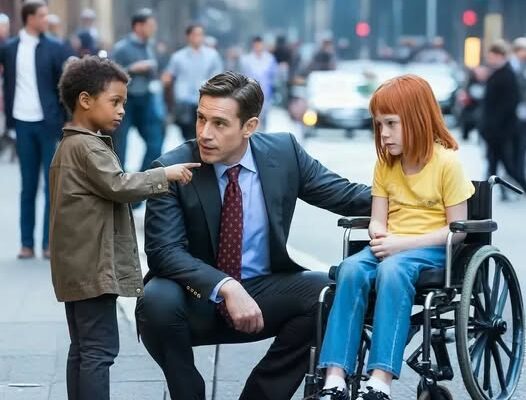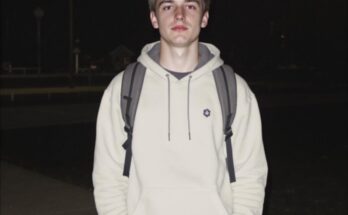The wind hit sharp that morning, skimming off the concrete like it had somewhere to be. Outside the Children’s Medical Center in Birmingham, the air smelled like antiseptic and wet leaves. Inside, lives shifted on whispers, scan results, and long silences. But out front, a different kind of stillness held its ground.
He sat alone near the revolving doors—a boy, maybe nine, in an oversized coat with duct-taped boots and a red knit hat pulled low over his brow. His fingers worked slowly, carefully, over a battered notebook resting on his lap. Every so often, he’d glance up—not at the traffic, not at the sky, but at the people.
Nurses on smoke breaks. Parents clutching coffee cups like anchors. Security guards who once tried to chase him off but had given up weeks ago. Nobody quite knew who he was. Nobody asked. That’s just the way it was outside a hospital like this—people passed like ghosts, and nobody wanted to believe in miracles anymore.
Except maybe the boy did.
A luxury SUV pulled up across the street—dark gray, windows tinted, engine still running. The kind of car that said money without having to shout. Inside sat a man with silver at his temples, fatigue in his eyes, and a wrinkle in his collar that betrayed a long night. His hand hovered near the ignition. In the back seat, a little girl stared out the window, silent and still under a pink blanket.
They didn’t see the boy. Not yet.
But he saw them.
And when the man finally stepped out, scooped the girl into his arms, and started toward the building, the boy stood. No fanfare. No drama. Just a soft voice that slid through the cold like it had weight.
“Sir,” he said.
The man didn’t stop.
“I can make your daughter walk again.”
This time, he did.
It wasn’t the kind of line you expect outside a hospital. Not from a kid. Not from someone whose shoes looked like they’d barely survived the week. But the tone… it wasn’t playful. It wasn’t pitying. It was calm. Steady. Unshakable.
The man turned slowly.
“What did you say?” he asked, clutching the girl tighter.
The boy’s face didn’t change. He closed his notebook. Took one step forward.
“I said I can help her walk.”
Silence.
Somewhere nearby, a car door slammed. A nurse laughed behind a window. But the world between those two—the man and the boy—had gone utterly still.
You could almost hear the air shift. Not because of what was said.
But because of what might happen next…
The man blinked. Twice. Like he was trying to reset the moment. The little girl in his arms stirred but didn’t say anything—her arms limp, legs wrapped in soft braces, eyes distant.
“You’re… what? Nine?” the man finally said. “What are you even talking about?”
“I’m ten,” the boy replied. “But I’ve been helping people since I was seven.”
That should’ve been the end of it. Any other day, any other man would’ve turned and walked inside, convinced the cold was playing tricks on his ears. But something about the way the boy stood—like he meant it—froze the millionaire in place.
“My daughter’s name is Ivy,” the man said cautiously. “She hasn’t walked in over a year.”
The boy nodded like he already knew. “Spinal inflammation after viral meningitis. Her nerves healed, but the muscles forgot. They’re scared now. Like she is.”
The man’s mouth parted. “How do you know that?”
“I watch. I listen.” The boy stepped forward again. “And I draw.”
He opened his notebook, flipping past pages full of tiny, delicate sketches—spines, nerves, muscles, feet midstep. And then he pointed to one. It was a girl—stick-thin legs and eyes too big for her face, but smiling. Running. “This is Ivy. Three weeks from now.”
The man looked shaken. “Are you some kind of—you’re not a doctor. What, some internet thing? Hypnosis?”
The boy smiled, but it wasn’t smug. Just tired. “No tricks. I just… understand movement. I don’t know why. But I’ve helped three kids so far. One in Selma. One in Tallahassee. One in Tulsa.”
“And where are your parents?” the man asked, his voice tightening.
The boy didn’t answer. He just rubbed the edge of his knit hat, suddenly looking much younger. “Not important.”
The man hesitated. Ivy’s eyes opened wider now, watching the boy.
“Daddy,” she whispered. “Let’s try.”
And that was the moment everything shifted.
They started with small movements in the hospital garden—a place usually reserved for silent grief and bad coffee. The boy came every morning. No equipment. No medicine. Just motions. Repetition. Whispers that somehow made Ivy giggle. He showed her how to trust her legs again, not just force them.
“Your legs aren’t the problem,” he told her one morning. “Your fear is.”
And damn if it didn’t start working.
By the end of week one, Ivy was standing, clinging to the bench like it might float away.
By week two, she was taking shaky steps—three, sometimes four—before collapsing into laughter. Her father, whose name I eventually learned was Marcel DeLaney, started smiling again. Real, deep smiles that made you forget he once owned half of downtown Atlanta.
But none of us knew the real twist until week three.
That was when a local reporter, doing a puff piece on “The Miracle Garden,” recognized the boy from a missing persons database.
His name wasn’t just “the boy.” It was Elian Mercado. He’d disappeared from a foster home in Mississippi two years earlier after a string of placements no one cared enough to follow up on.
Ivy’s dad, Marcel, hit the roof. He confronted Elian that same day.
“You lied to me.”
“I never lied,” Elian said calmly. “You never asked who I was. You asked what I could do. And I did it.”
“Do you even know where your family is?”
“No. And I don’t think they’re looking.”
Marcel didn’t know what to say to that. I don’t think anyone would’ve.
But Ivy—bless her—did.
“Then stay with us.”
Marcel tried to argue, tried to explain courts and paperwork and custody battles. But Ivy wouldn’t hear it. And honestly, neither would Elian.
He stayed in a guest room for a while. Went to therapy. Marcel hired a lawyer. The story hit local news, and eventually national.
They didn’t call him a beggar anymore.
They called him The Healer Kid.
Eventually, Marcel formally adopted Elian. Said he owed him more than gratitude—he owed him family. Ivy walked across the stage at her middle school graduation the next spring, holding Elian’s hand the whole time.
And me?
I was the nurse on the smoke break that first day. I saw it all. Said nothing. Just watched, like everyone else, unsure if I was seeing a fluke or a phenomenon.
But now I know the truth.
Some people have gifts that science can’t explain. Some kids get broken so early they learn how to fix what no one else can. And some moments—tiny, frozen slivers in the chaos of life—change everything.
Life Lesson? Sometimes, healing doesn’t come from doctors or miracles. Sometimes it comes from someone who simply refuses to give up on you—even when they’ve got every reason to give up on the world.
If this story moved you even half as much as it did me, please share it. You never know who needs to read it today. ❤️
👇
(share your thoughts or tag someone who needs to hear this)



